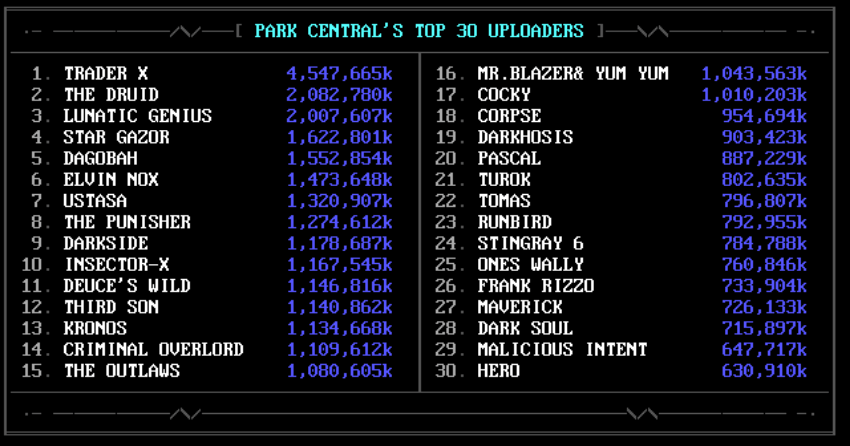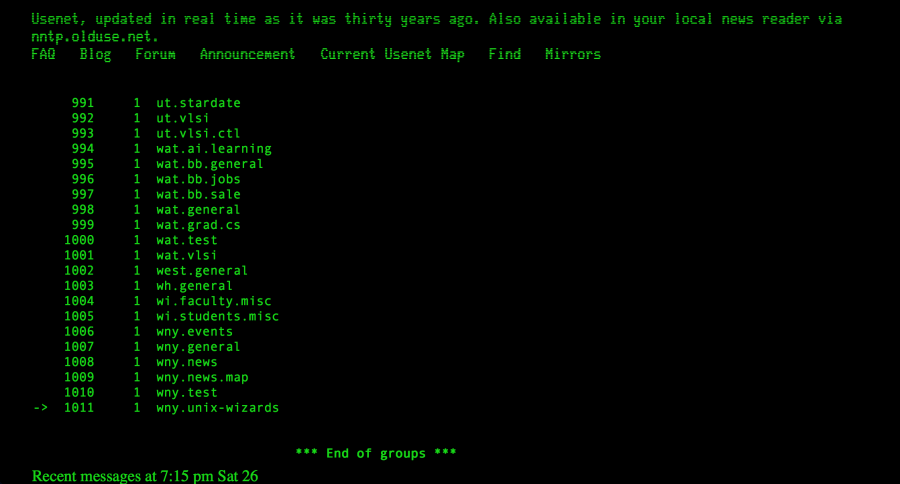Online Piracy: Downloading and viewing movies or series from the internet, although illegal, is very common.

For many years before the start of the internet we know (www) piracy survives by continuously changing ways of promotion through different technologies.
Online Piracy: Let's look at technologies used since the 70s:

Xmodem was a point-to-point binary transport protocol developed by Ward Christensen. In February of 1978 Wards Christensen's CBBS became the first Bulletin board system or briefly bbs. BBS had access to the internet via the telephone line until the beginning of 1990.
1979 appeared Usenet by Tom Truscott and Jim Ellis. They were students at the University of North Carolina and at Duke University respectively.

Usenet's primary purpose was to share articles through local categories (Usenet newsgroups), but it was also used to share files. Until today 2018 newsgroups continue to distribute records.
But to understand the times we report we should say that 1980 the higher speed was from 300 to 9600 bits per second. Memory and CPU speed were minimal. CPUs at 50 MHz were available to consumers at the end of the decade.
Online Piracy: Still, piracy holds up well… 80s

The Kermit protocol 1981 appeared and could be used with telnet or other BBS systems for file transfer.

In October 1985 appeared in File Transfer Protocol (FTP). This protocol (we still use it today) allows the download and upload of files to servers.
In August of 1988 appeared Internet Relay Chat developed by Jarkko Oikarinen.
FTP, IRC, and Usenet protocols were heavily used in the 90s. However, audio and video compression technologies (MP3, AAC and MPEG) were also developed which allowed the minimization of file size.
Online Piracy: The 90 has grown a lot.
1990, for example, Michael Sandrof added the protocol Client-to-client on IRC client ircII allowing files to be distributed through Internet Relay Chat.
In November 1990 was proposed World Wide Web by Tim Berners-Lee and Robert Cailliau.
In June of 1999, it was created Napster by Shawn Fanning. Napster allowed its users to search for what they shared. It had a central server with files that could be indexed, but many of the files that were shared remained on the systems of the users who started the distribution. It was an early kind of peer to peer.
In the course of years, the technology has begun. They came and passed protocols like this KazaaWhile eMule which was released at the beginning of 2000 is still there. Thousands of websites started and stopped working due to legal problems.
Online Piracy everywhere…
The piracy of movies and TV series has pre-existed the internet and has been treated as a serious problem for the industry since the era of VHS video tapes and related smuggling. However, it is digital technology and the internet that have allowed the phenomenon to take on explosive proportions and become part of the daily practice of thousands of users around the world.
The ease of creating flawless digital copies and the speed of their mass distribution among thousands of anonymous nodes on the Internet, which act as open conduits for a continuous search and exchange of files on a global scale, allows pirated trafficking practices to proliferate, become accessible to every user and to extend to every product that can be digitized (from books and texts, to music and songs, photographs, comics, images and drawings, computer programs and, of course, films, television programs and digital games).
Soon, this massive practice of free-to-air file sharing has been the cohesive web for the creation of networked communities with intense pirated activity, and has been linked to it with an entire culture of political and moral legitimacy.
More and more users, more and more actively, claim the right to free access to cultural products and goods asking to be common to all, on the model of other public goods.
In addition, many users are reacting to the limitation of fair use rights for legally acquired products, and defend the right to their free enjoyment among members of a community or friends, gift and offer, against the logic of commercialization and pricing of everything.
The principles of the free flow of information and the Internet frame more or less radical demands, which oppose the strict protection policies of intellectual property and, by extension, the business interests associated with it.
Naturally everyone is right, or so they support at least. Of course, we would not expect anything other than the copyright holders, or to say it better than the industry that manages them.
What to believe? Personally, I find it hard to believe anything that is motivated by money. For example, you all know what happened to her our own AEPI.
Update: The article was updated after a particularly interesting comment we received on Facebook from my iGuRu.gr friend Qiao Zhi Wei
1980 Decade:
Capture Cartridges with Spectrum applications / games on a cassette or dual tape deck.
1990 Decade:
Full subscription to Germany or the Netherlands and send you a 5GB DAT (digital audio tape) that you had in it (programs, movies, games, songs, songs).
It was much better than CD / DVD recorders…
2000 Decade:
With the widespread use of the internet, those who copied cd and dvd were renamed "hackers", while initially they were called "copiers", since many people were afraid to go online to not "steal"….
The price of cd / dvd recorders dropped to a normal value for a simple user.
Free internet copy programs were released (despite companies' attempts to avoid duplicate copying) (CloneDVD, CloneCD with Sheep Mark).
The world was buying cd / dvd gaps in hundreds, in jigsaws, in cake and copying was generalized.
2010 Decade:
With the use of usb, and the spread of Bluetooth (which for many years was dormant) EVERYONE copies, EVERYTHING, even if it is "illegal" with the well-known excuse "I did not know, they gave it to me". If the first one copies it, millions of people automatically get it (see what happened to the movie Green book).
The friend from Facebook reported that at that time the Police were visiting DVD / CD sales companies and asking for situations of those who bought mass trays to locate the cops.
Thank you shared with us his memories. Adding to the article we think is very important as there are some who do not know the story.
How it started and how a movement evolved, confronted with any organization that was trying to silence the information to its economic exploitation.
As for you, the comments are open to everyone…
__________________________
Πηγές
Timeline of file sharing
diadiktiake peirateia





